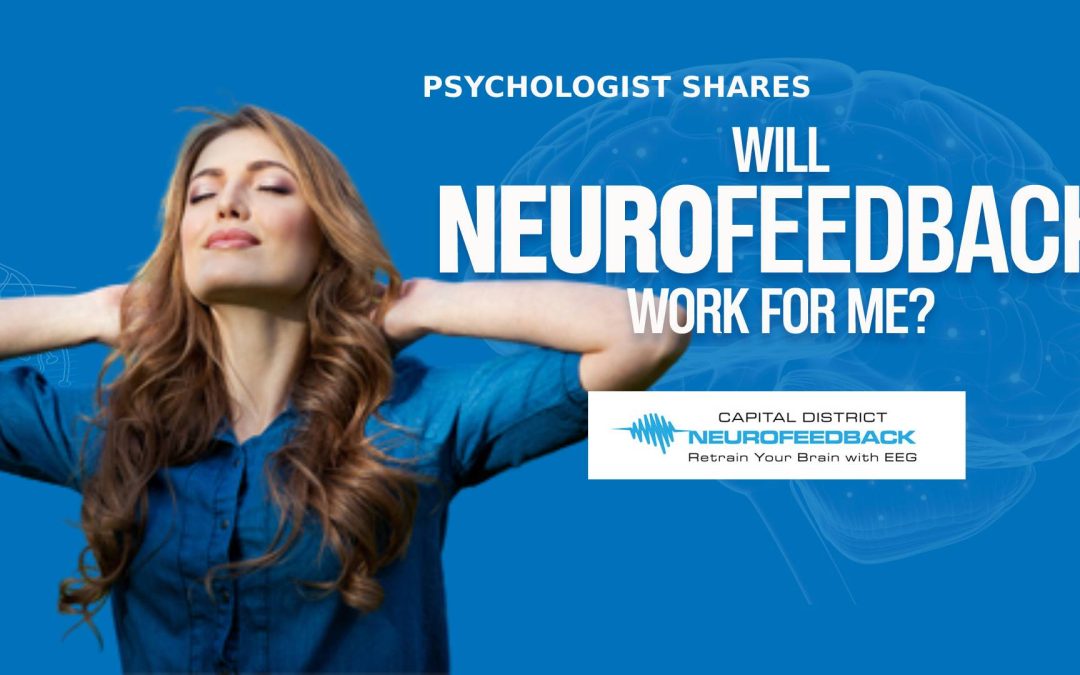I’m often asked, will neurofeedback work for me?
Loading Video...
Now, if I knew the answer to that question 100% of the time, I’d get paid a lot more here in the Albany area. And you and I both know I can’t answer that for certain. However, Neurofeedback works through a process of rewarding brainwaves as they naturally change or alter. Over time, we see that almost everyone responds to neurofeedback.
Now some respond a little more rapidly, for some people it takes a little more time. But if you look at the research, despite some of the naysayers, you’d see study after study whether we are looking at adhd, depression, anxiety, head injuries, recent studies on dementia and Alzheimer’s show that brains typically change as long as we consistently reward changes or movement toward a healthier brain wave.
And so again, we don’t know for sure, but I can say that with 98% of the folks who work with our practice, they have seen growth and improvement, and that’s been a consistent pattern over the years. So if you have questions, reach out, I’d be happy to answer them.
What Are The Main Symptoms Of Anxiety?
Chronic anxiety affects the mind and body in different ways. While a person’s sympathetic nervous system is naturally at work when experiencing anxiety, it is not the only reason for feeling tense. Anxiety symptoms can be debilitating and make people feel much worse than they are. Anxiety can lead to many physical problems, including an elevated heart rate and high blood pressure.
Anxiety can affect the body in both the short and long term. The heart rate and breathing rate may increase, and people may experience lightheadedness and difficulty concentrating. It can also impact the immune system and the digestive system. Anxiety can affect all body parts, including the respiratory, digestive, and cardiovascular systems. If these symptoms are present in a patient, they may require treatment. For most people, anxiety involves a combination of psychological and physical symptoms. An anxiety disorder could manifest as symptoms that interfere with your daily life.
The American Psychiatric Association describes anxiety symptoms as follows:
• Sleeping problems, such as fatigue and insomnia
• Unexplained aches, muscle tension, and headaches
• Digestive problems, such as nausea
• Excessive worry
• Low self-esteem
• Rapid heart rate
• Difficulty concentrating
• Irritability
When Is It Time To See A Mental Health Therapist for Anxiety?
If you’re suffering from emotional distress, you may have wondered when it’s time to see a therapist. Some people decide to wait and see if time, changes in lifestyle or support will improve their situation. While these solutions can help, therapy must address the root of emotional distress. When symptoms start to control your life or can do harm, it may be time to seek help.
Depression is a common affliction. Whether you’re experiencing anxiety or depression, this mood disorder affects your thoughts, feelings, and actions. Sadly, depression affects one in six adults. Fortunately, there are many ways to find a therapist. This article will cover some of the most common signs and symptoms of depression. Consider these tips when deciding whether to seek professional help.
It would help if you considered seeing a therapist when you suffer from depression, anxiety, or other mental distress. You should seek help if you feel hopeless, depressed, or angry. Unhealthy habits often cause these feelings. Sometimes you might use alcohol or drugs to cope with stress, but a therapist can help you break the pattern. They can help you learn new strategies to cope with these emotions and feel better.
Loading Video...
Why Is Neurofeedback Therapy So Effective Against Anxiety
I’m often asked why neurofeedback is so effective. I think it’s an interesting question because there are few technologies that try to work with the brain and use the brain’s own natural learning ability to make change. Neurofeedback is one of them. There’s nothing forceable that happens to the brain. All we’re doing is rewarding the brain as brainwaves move toward a healthier direction.
And in that process we find that most diagnoses, most things that we struggle with, that are caused by brain dysregulation, get better as the brain regulates better, and more effectively. In recent years as the technology has improved, we’re able to do a QEEG rather frequently, and that gives us a map and the layout of the brain.
But most importantly, we’re now able to offer home training and increase the frequency of this effective training for most people and make that much more affordable and convenient. This combination of factors add up to remarkable improvements with the effectiveness of neurofeedback.





